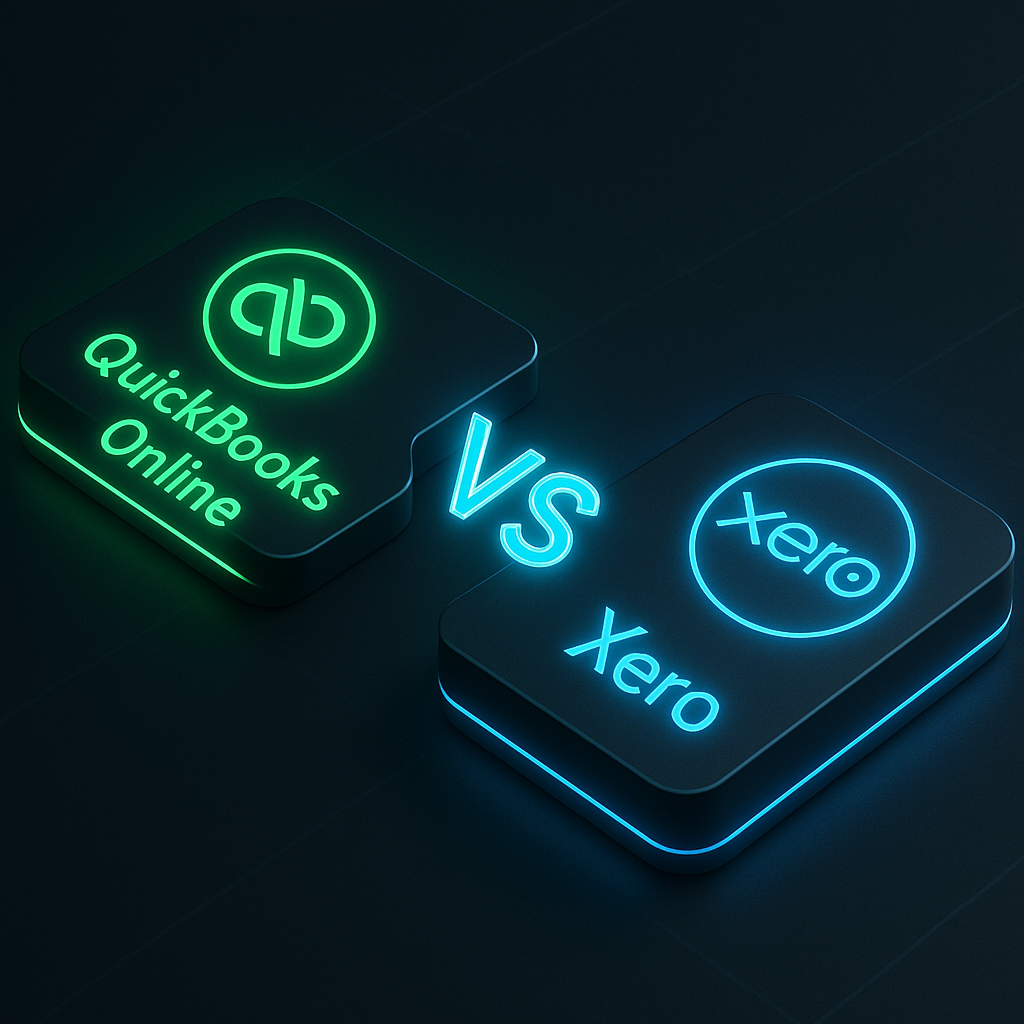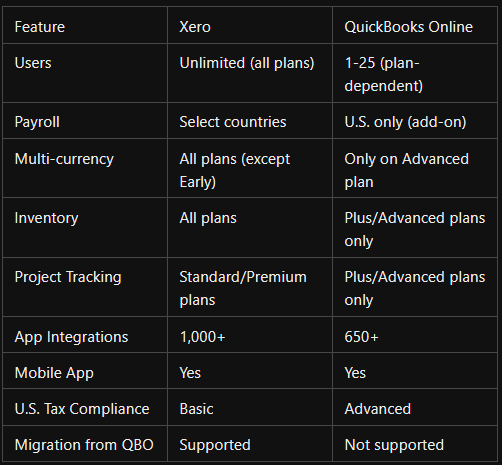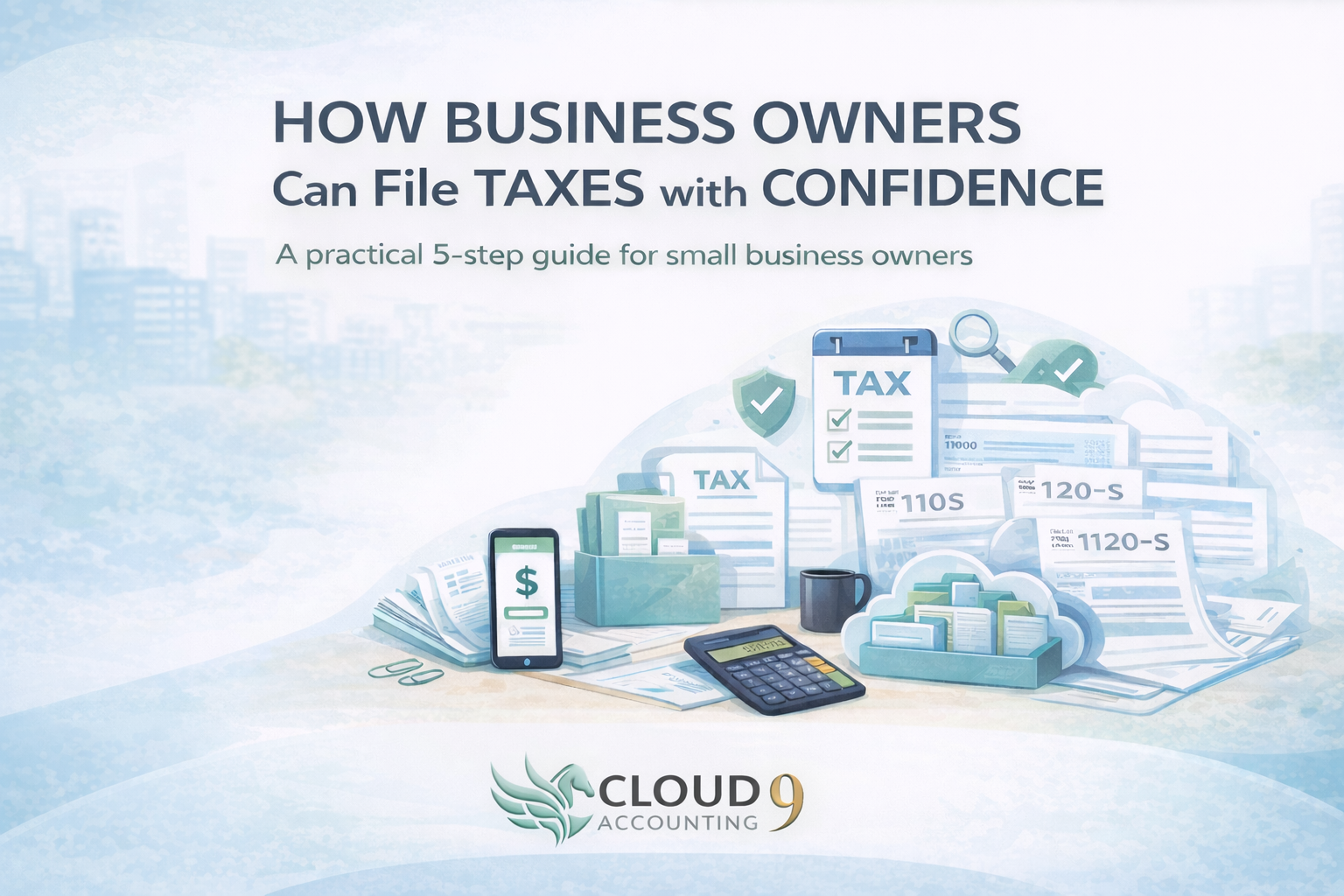Xero vs. QuickBooks Online: A Deep Dive for Business Owners
Both Xero and QuickBooks Online (QBO) offer robust cloud-based solutions, but each has unique strengths and limitations.

What Is Xero?
Xero is a cloud-based accounting solution founded in New Zealand, now serving businesses worldwide. It’s designed for small to medium-sized businesses and is known for its clean interface, automation, and global capabilities.
Key Features:
- Unlimited users on all plans
- Automated bank feeds and reconciliation
- Invoicing, quotes, and bill management
- Inventory tracking
- Multi-currency support
- Payroll (in select countries)
- Project tracking and time management
- 1,000+ third-party app integrations
- Mobile app for iOS and Android
What Is QuickBooks Online?
QuickBooks Online is Intuit’s flagship cloud accounting product, dominating the U.S. market. It’s designed for small businesses but scales well for larger organizations.
Key Features:
- Tiered user access (1-25 users, depending on plan)
- Automated bank feeds and reconciliation
- Invoicing, estimates, and bill pay
- Inventory tracking (on higher-tier plans)
- Payroll (U.S. only, add-on)
- Time tracking (with add-on)
- Tax calculation and filing (U.S. focused)
- 650+ app integrations
- Mobile app for iOS and Android
In-Depth Pros and Cons
Xero
Pros:
- Unlimited Users: No extra cost for adding team members, bookkeepers, or accountants.
- Global Reach: Multi-currency, VAT/GST support, and compliance with international standards.
- Automation: Bank feeds, recurring invoices, and rules-based transaction matching save time.
- App Marketplace: Integrates with a vast ecosystem of business tools (CRM, e-commerce, payroll, etc.).
- Clean Interface: Modern, intuitive design makes onboarding easy.
- Migration Support: Xero offers free or low-cost migration from QuickBooks Online, including historical data.
- Audit Trail: Strong tracking of changes for compliance and transparency.
Cons:
- Payroll Limitations: Payroll is only available in select countries (not the U.S. as of 2025).
- U.S. Tax Features: Less robust for U.S. sales tax and payroll tax filings compared to QBO.
- Learning Curve: Some advanced features (custom reports, rules) require training.
- Customer Support: Some users report slower response times compared to Intuit.
QuickBooks Online
Pros:
- U.S. Market Leader: Most accountants and bookkeepers in the U.S. are familiar with QBO.
- Comprehensive Features: Payroll, tax, inventory, and time tracking are all available (with add-ons).
- Strong Reporting: Highly customizable reports and dashboards.
- Banking Integrations: Excellent support for U.S. banks and credit cards.
- App Ecosystem: Hundreds of integrations for payments, CRM, e-commerce, and more.
- Support: 24/7 chat and phone support, plus a large user community.
Cons:
- User Limits: Each plan has a cap on users; adding more increases costs.
- Price Increases: Costs can rise quickly as you add users or advanced features.
- International Features: Multi-currency and global compliance are less robust than Xero.
- Occasional Sync Issues: Some users experience problems with bank feeds or app integrations.
- Learning Curve: The interface can feel cluttered, especially for new users.
Advanced Feature Comparison

Real-World Use Cases
Xero is ideal for:
- Businesses with international operations or clients
- Companies needing unlimited users (e.g., multiple owners, bookkeepers, and advisors)
- Startups and e-commerce businesses using global payment processors
- Firms wanting robust automation and integration with niche apps
QuickBooks Online is ideal for:
- U.S.-based businesses needing payroll and tax compliance
- Companies with a single bookkeeper or small team
- Businesses that want deep integration with U.S. banks and payment processors
- Firms whose accountants already use QuickBooks
Migration: Moving from QuickBooks Online to Xero
Xero offers migration services for businesses switching from QuickBooks Online. This typically includes:
- Transferring your chart of accounts, contacts, and historical transactions
- Importing open invoices, bills, and bank transactions
- Setting up bank feeds and integrations
- Training and support during the transition
Tip: Always review your data after migration and consult with your bookkeeper or accountant to ensure accuracy.
Frequently Asked Questions (FAQs)
Q: Can I migrate all my data from QuickBooks Online to Xero?
A: Yes, Xero offers migration tools and support to transfer your chart of accounts, contacts, invoices, bills, and historical transactions. Some custom reports or app integrations may need manual setup.
Q: Which is better for inventory management?
A: Both offer inventory tracking, but Xero includes it in all plans, while QBO reserves it for higher-tier plans. For advanced inventory (e.g., manufacturing), consider third-party integrations.
Q: Is Xero or QuickBooks Online better for international businesses?
A: Xero is generally preferred for international businesses due to its multi-currency support and global compliance features.
Q: How secure is my data?
A: Both platforms use bank-level encryption, two-factor authentication, and regular security audits.
Q: Can I use either platform on my phone?
A: Yes, both Xero and QuickBooks Online have mobile apps for iOS and Android, allowing you to invoice, reconcile, and check reports on the go.
Q: What if my accountant only uses QuickBooks?
A: QuickBooks Online is the U.S. standard, but Xero is gaining popularity. Many accountants now support both, and Xero offers advisor certification programs.
Q: How do pricing and value compare?
A: Xero’s unlimited users can be a major cost saver for growing teams. QuickBooks Online’s pricing can increase with more users or add-ons. Always compare current pricing and features before deciding.
Q: Can I integrate payroll and time tracking?
A: QBO offers built-in payroll and time tracking (add-ons). Xero integrates with third-party payroll and time tracking apps in the U.S.
Q: What support is available?
A: QuickBooks offers 24/7 support and a large community. Xero provides email and chat support, plus a growing advisor network.
Conclusion
Both Xero and QuickBooks Online are powerful, cloud-based accounting solutions. Your choice depends on your business’s size, location, team structure, and growth plans.
- Choose Xero if you want unlimited users, global features, and easy migration from QuickBooks.
- Choose QuickBooks Online if you need U.S.-centric payroll, tax compliance, and a platform familiar to most U.S. accountants.
Need help deciding or migrating?
Cloud 9 Accounting specializes in both platforms and can guide you through setup, migration, and ongoing support.
Lastest blog posts
Contact us
Discover how we can simplify your bookkeeping, streamline your accounting, and help you make smarter financial decisions. Reach out today! We’re here to help you save time, reduce stress, and grow your business.





